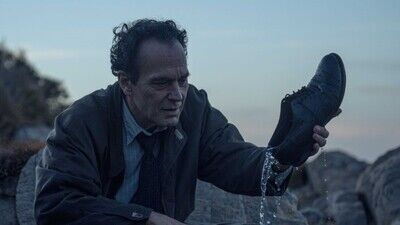This, we learn, was in 1990; the movie cuts ahead to 2012, and its director Miguel Garay (Manolo Solo, whose deep-set eyes convey universes of worry and sadness) is approached by a Spanish television series called “Unresolved Cases”—yes, the “Unsolved Mysteries” thing is worldwide—to discuss the movie and his missing friend. He’s not sure about working with these people, but they seem to have integrity and they’re offering him some money, which he can use. The “Farewell Gaze” experience put him off directing—you can see why it might—and after writing a novel or two he’s barely scraping together a living as his dotage approaches. Researching on behalf of the program takes him into some storage facilities, and even another part of Spain altogether (the movie begins in Madrid). He consults his adult daughter (played by Ana Torrent, the little girl beguiled by the image of the Frankenstein monster in “Beehive”), an old girlfriend, and his former film editor. All through his journeys the movie retains a quiet tone, one that grows ever more contemplative as the story inches forward. This nearly three-hour film is likely to be checked off as “slow cinema” by some, and the descriptor is correct. But Erice’s deeply personal style isn’t tied to anything resembling a trend.
The movie’s central mystery is solved about two-thirds of the way into the film’s running time. It’s not paradoxical in any way that the film becomes even more enigmatic after that. “Close Your Eyes” is about seeing, and about recording what you see, and it’s also about what you can’t see even when you’re looking. That is, a reintroduced character does not convey to the viewer anything definite in terms of what’s going on inside them, what they recognize or what they don’t. We have an epistemological puzzle here that you may or may find the film’s finale, in which the last ten minutes of “Farewell Gaze” are screened for an invitational audience in the hopes of unlocking something for one of its viewers, solves. Or, again, not.
The movie’s senses of cinema are never present for self-consciously clever, self-referential reasons. Rather, they’re deeply intertwined with considerations of age and mortality. The searching of a now-84-year-old maestro of cinema is exquisitely moving and speaks with an urgency that isn’t at all undermined by the films languid pace.

